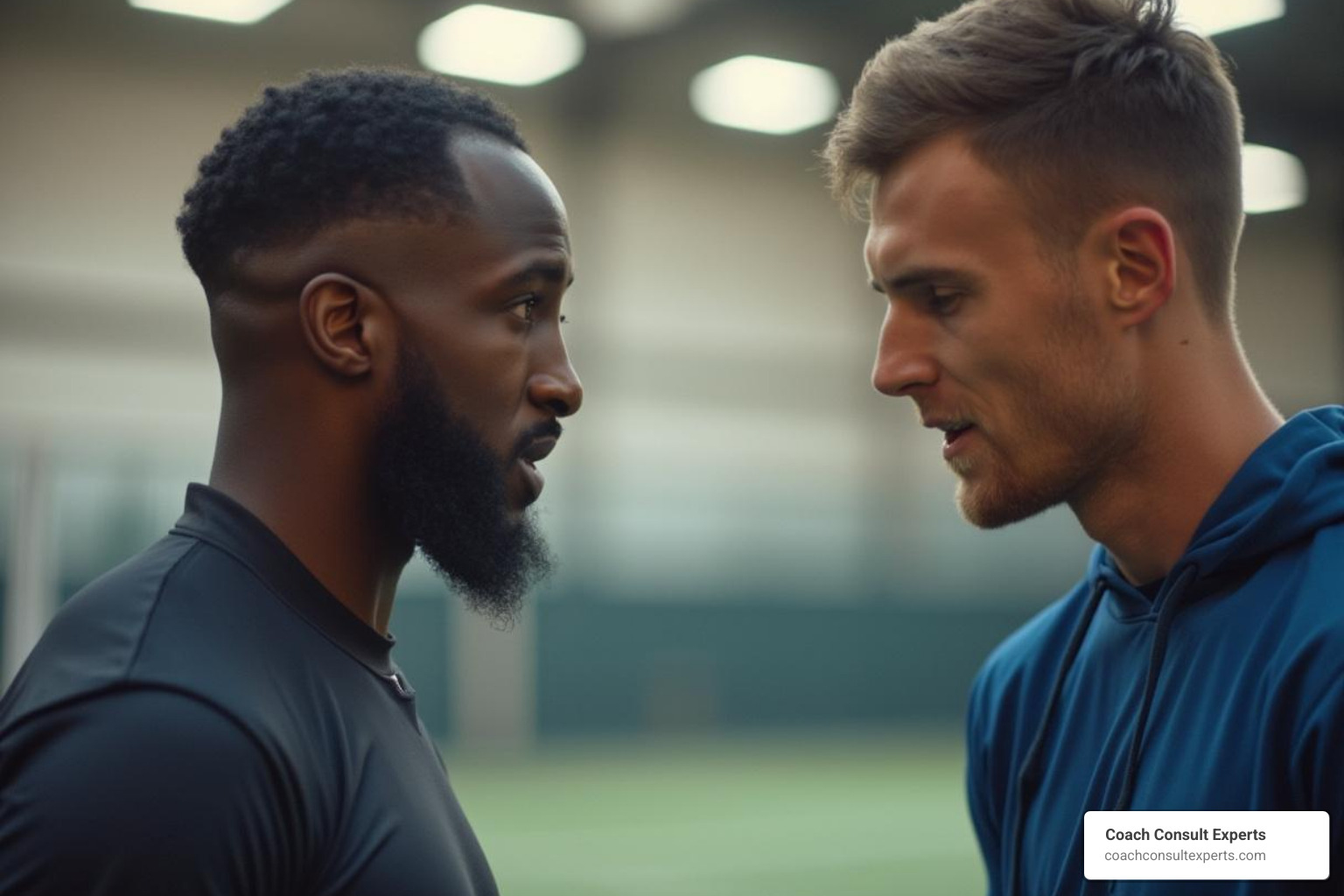Sports Mindset Coach: 7 Powerful Benefits for 2025 Success
What Is a Sports Mindset Coach? (Simple Explanation & Quick Guide)
A sports mindset coach helps athletes build strong mental skills – like confidence, focus, and resilience – to perform at their best, handle pressure, and enjoy their sport more. Unlike a technical coach who teaches physical skills, or a sports psychologist who may address deeper mental health concerns, a sports mindset coach focuses on practical strategies that boost everyday performance.
Quick Answers: What Does a Sports Mindset Coach Do?
| Role | Focus | Who Benefits | Common Outcomes |
|---|---|---|---|
| Sports Mindset Coach | Mental skills for performance | Athletes, teams, parents | Greater confidence, focus, resilience, and enjoyment in sports |
In plain English:
A sports mindset coach is your guide for the mental side of sports. They teach proven tools to help you stay calm under pressure, shake off mistakes, and open up your best self – on and off the field.
Athletes of all ages and skill levels – from beginners to pros – can benefit from sports mindset coaching, often seeing improvements within weeks.
“In sport, success is often said to be 80% mindset and only 20% physical ability.”
I am Coach Mary Chege-Kamau, a certified professional coach with years of experience helping athletes and performers worldwide. My work as a sports mindset coach has empowered thousands to overcome self-doubt and reach their goals with clarity and purpose.
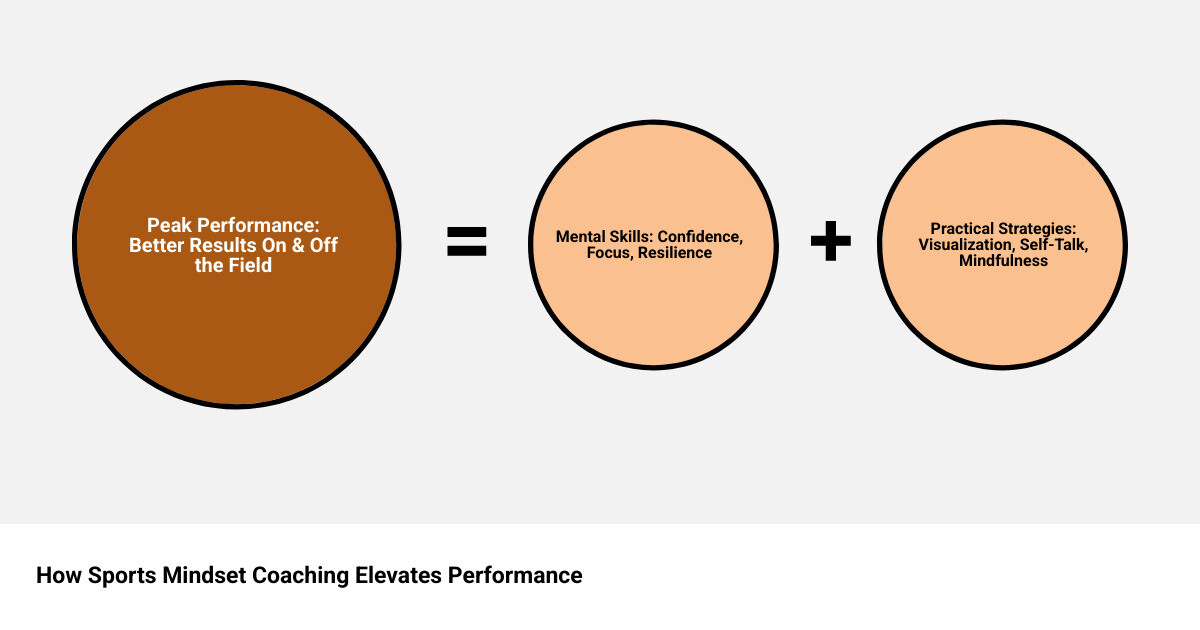
Find more about sports mindset coach:
What Does a Sports Mindset Coach Actually Do?
Think of a sports mindset coach as your personal trainer for your brain. Just like you work with a physical trainer to build stronger muscles, we help you develop the mental muscles that turn good athletes into great ones.
We combine practical, science-backed techniques with your unique personality and goals. Every athlete has different challenges – maybe you’re crushing it in practice but freezing up during games, or perhaps you’re dealing with that inner voice that won’t stop criticizing every move.
We start by really getting to know you. This isn’t just a quick chat about your sport. We dig into your performance patterns, identify what’s working (and what isn’t), and figure out exactly where your mind might be holding you back.
Then we build your personalized mental toolkit. This might include visualization techniques that help you see success before it happens, breathing strategies that calm your nerves in clutch moments, or ways to flip negative self-talk into something that actually helps you perform better.
Here’s where it gets really interesting – much of our work happens at the subconscious level. Those automatic thoughts that pop up when you’re under pressure? We help rewire them so your brain starts working for you instead of against you.
| Professional Type | Primary Focus | Training Required | Session Style |
|---|---|---|---|
| Sports Mindset Coach | Performance improvement through mental skills | Coaching certification, sport experience | Action-oriented, skill-building |
| Sports Psychologist | Clinical assessment and treatment | Advanced psychology degree, licensing | Therapy-based, diagnostic |
| Technical Coach | Physical skills and strategy | Sport-specific certification | Skill instruction, tactical training |
How a Sports Mindset Coach Differs From a Sports Psychologist
I’m focused on making you better at your sport, not treating mental health conditions. While a sports psychologist might explore deeper psychological issues or diagnose conditions, I’m all about building the mental skills that directly improve your performance. Think of it this way – if you’re struggling with clinical depression, you’d want a psychologist. If you want to stop choking under pressure, that’s where I come in.
Our training backgrounds are different too. Sports psychologists typically have advanced psychology degrees and clinical licenses. As a sports mindset coach, I come from the coaching world with specialized training in mental performance techniques.
Our sessions feel different as well. When you work with me, we’re not diving deep into your childhood or exploring complex psychological patterns. We’re building practical skills you can use in your next game or competition.
Signs You Need a Sports Mindset Coach
You know that feeling when you’re physically ready to perform but something invisible seems to be holding you back? That’s often when athletes realize they need to work on the mental side of their game.
Maybe you’re stuck at a performance plateau. Your coach says your technique looks great, you’re putting in the work during practice, but you just can’t seem to break through to that next level.
Or perhaps your performance is all over the map. One day you’re on fire, feeling unstoppable. The next day, it’s like you forgot how to play your sport. This inconsistency can be incredibly frustrating.
Fear of failure is another big one. You find yourself playing it safe when you should be taking calculated risks. You hold back in crucial moments, worried about making mistakes instead of focusing on making great plays.
That critical inner voice is working overtime. You know the one – it never seems to take a break from pointing out everything you did wrong. Long after a game is over, you’re still replaying mistakes in your head.
As one athlete told me, “I started to see results in about three to four weeks” after we began working together. The beautiful thing about mental skills training is that small shifts can create big changes surprisingly quickly.
Benefits of Mindset Coaching for Athletes at Every Level

Working with a sports mindset coach is about so much more than simply winning games. The real magic happens in the way these mental skills impact every part of an athlete’s life, both now and in the future.
When you train your mind, you develop greater confidence. You start to truly trust your abilities, even when the pressure is on. Challenges become opportunities, and mistakes turn into lessons instead of roadblocks. This boost in confidence spreads into all areas of life, not just sports.
Focus and resilience are other big wins. With practice, athletes learn how to block out distractions and stay in the moment, whether that’s on the field, in the classroom, or during a tough test. When setbacks happen, a strong mindset means bouncing back faster and smarter.
Handling pressure is a huge part of sports at any level. A good mindset coach will teach you how to keep calm, breathe, and perform your best – even when the stakes are high or the crowd is loud. Those same skills often help with things like public speaking or big exams.
Many athletes report an overall boost in well-being and happiness. Their relationships improve as they learn better communication and emotional control. Mental skills like these don’t just help now; they build a strong foundation for future success, from school to the workplace.
For student-athletes, all this work can pay off as scholarships and extended careers. One coach loves to ask, “What would you invest in yourself today if it meant a $200,000 scholarship tomorrow?”
No matter your age or stage, a sports mindset coach brings age-appropriate tools. Young athletes (ages 8-14) build joy and confidence in their sport, while high schoolers learn to juggle pressure from coaches and classes. College athletes get help with the jump to higher competition, and pros learn how to stay sharp and enjoy long, successful careers.
These results are backed by science. Scientific research on mindfulness for athletes shows that mental training can lead to real changes in confidence, focus, and consistency – sometimes by over 50 percent in just two months, and even doubling improvements in six months.
With a sports mindset coach at your side, you are investing in skills that last a lifetime. The rewards go far beyond sports, touching every part of life where grit, calm, and confidence are needed most.
Core Mental Skills & Techniques Taught
When you work with a sports mindset coach, you’ll learn a complete set of mental tools that can transform how you perform and feel about your sport. These aren’t mysterious concepts – they’re practical skills that thousands of athletes use every day to stay calm, focused, and confident.
Visualization and mental rehearsal form the foundation of mental training. You’ll learn to mentally rehearse successful performances in vivid detail, helping your brain and body prepare for the real thing. This goes way beyond just “thinking positive” – it’s detailed mental practice that actually improves your muscle memory and builds confidence.
Self-talk management might be the most important skill you’ll develop. We all have that inner voice commenting on our performance, but most athletes let it run wild with criticism and doubt. A sports mindset coach teaches you how to catch negative thought patterns and replace them with constructive internal dialogue.
Neutral thinking often works better than forced positivity. Instead of trying to convince yourself everything will be perfect, you’ll learn to focus on facts and actionable steps. Research shows this approach keeps you grounded and effective, especially when the pressure is on.
Goal setting and process focus help you channel your energy in the right direction. You’ll learn how to set meaningful goals and then focus on the controllable processes that lead to success, rather than worrying about outcomes you can’t control.

Pre-performance routines become your secret weapon for consistency. Whether you’re stepping up to bat, walking onto the court, or preparing for a race, you’ll have a reliable routine that triggers your optimal performance state every single time.
Mindfulness and present-moment awareness keep you locked into what’s happening right now. No more replaying that mistake from the first quarter or worrying about the final score. You’ll learn to stay completely focused on the current play, which is where peak performance lives.
Breathing techniques might sound simple, but they’re incredibly powerful. These aren’t complicated meditation practices – they’re quick, effective methods to instantly calm your nerves and sharpen your focus when you need it most.
Grit training and resilience building teach you to bounce back from setbacks stronger than before. Instead of letting mistakes derail you, you’ll learn to view challenges as opportunities for growth.
For more detailed information about advanced mindset coaching techniques, Visit Dr. Cassidy Preston’s Personal Website.
Practical Exercises You Can Start Today
The best part about mental training? You can start building these skills right now, even without a coach. Here are simple exercises that any athlete can begin immediately.
Box breathing is your go-to technique for instant calm. Breathe in for 4 counts, hold for 4, exhale for 4, hold for 4. Repeat this 5-10 times before training or competition. It sounds almost too simple, but this technique can completely change how you feel under pressure.
WWKA questions help you think like a champion when facing challenges. Ask yourself “What Would [Your Role Model] Ask?” This technique helps you step outside emotional reactions and think strategically.
Mini-goals keep you motivated and confident. Instead of only focusing on big outcomes like winning championships, set small, achievable goals for each practice or game. These small wins build momentum.
Mistake recovery routines are game-changers for consistency. Develop a quick 3-step process: acknowledge the mistake briefly, take a deep breath, and refocus on the next play. Having this routine ready means mistakes won’t spiral into bigger problems.
Daily journaling takes just 5 minutes but creates powerful awareness. Write about what went well, what you learned, and what you’ll focus on tomorrow. This simple habit helps you see patterns and celebrate progress.
How Progress Is Measured
One thing that makes working with a sports mindset coach different from other types of training is how clearly we can track your mental improvement.
Baseline assessments give us a starting point by measuring your current levels of confidence, focus, resilience, and other key mental skills. This creates a clear picture so we can celebrate how far you’ve come.
Performance statistics help us connect mental training to real results in your sport. We track relevant metrics and look for patterns and improvements over time.
Confidence scales provide regular check-ins using proven measurement tools. You’ll rate how confident you feel in different situations, and we’ll track these numbers over time. It’s incredibly motivating to see your confidence scores climb week after week.
The combination of these measurement approaches ensures that your mental training stays on track and produces real, lasting results both in your sport and in your life.
How to Work With a Sports Mindset Coach
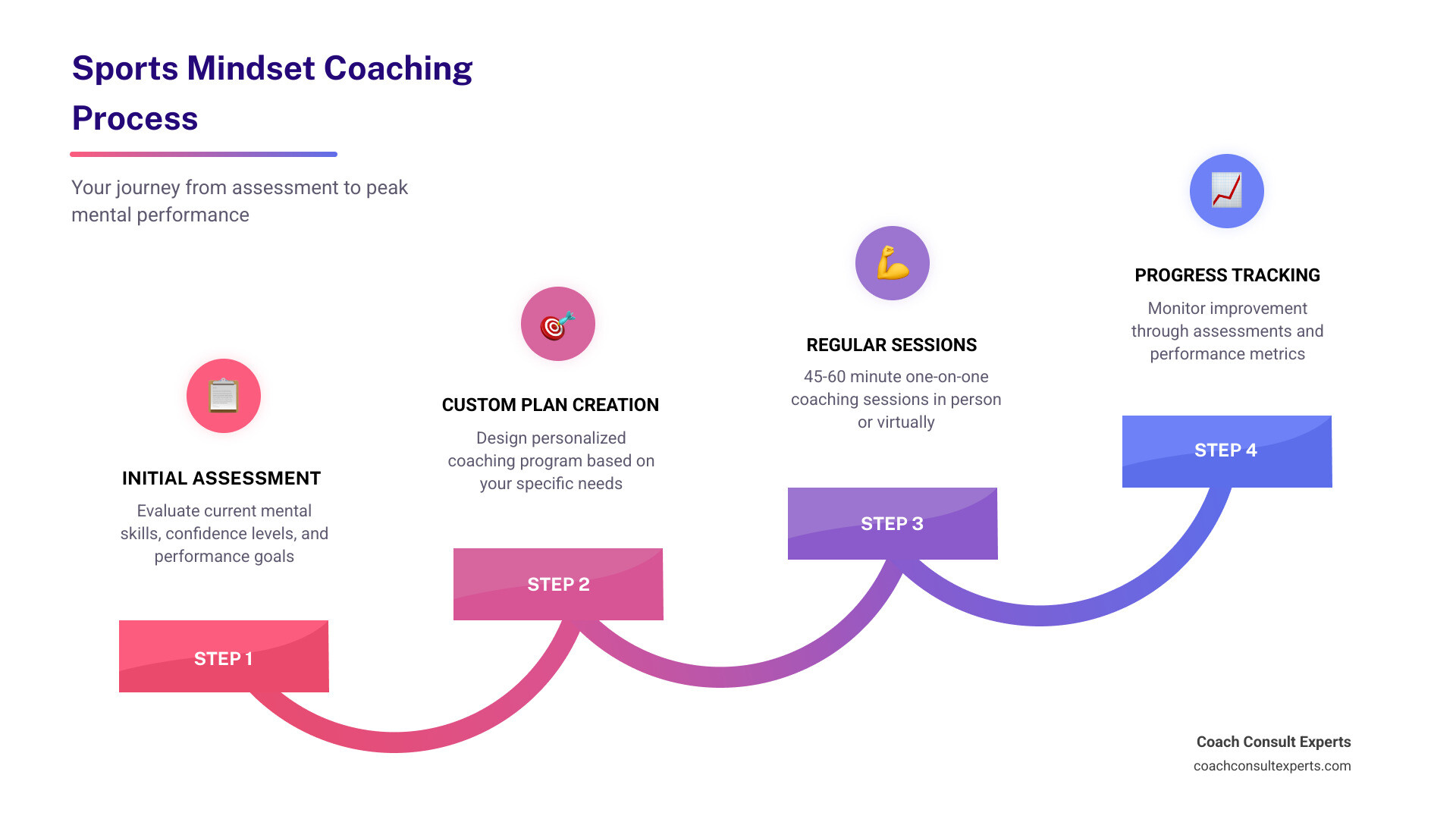
Starting your journey with a sports mindset coach doesn’t have to feel overwhelming. Think of it like learning any new skill – you start where you are, build gradually, and see results as you practice consistently.
Most programs begin with getting to know you. Your coach will want to understand your specific challenges, goals, and what makes you tick as an athlete. This isn’t just small talk – it’s the foundation for creating a plan that actually works for your unique situation.
One-on-one sessions form the heart of most coaching relationships. These typically last 45-60 minutes and can happen wherever works best for you – in person, over video calls, or even by phone. The beauty of mental skills training is that it’s portable.
Group workshops offer something different but equally powerful. When you work alongside other athletes, you realize you’re not alone in your struggles. Teams that train their minds together often develop stronger bonds and better communication.
Modern coaching includes digital support that keeps you connected between sessions. This might include helpful apps, online resources, or the ability to text your coach when you need a quick mental reset before a big game.
At Coach Consult Experts, we specialize in rapid subconscious change and supportive group coaching for lasting fulfillment. Our approach combines the personal attention you get in individual sessions with the powerful learning that happens when athletes support each other. More info about Group Coaching Programs.
Choosing the Right Coach for You
Finding the right sports mindset coach is like finding the right training partner – the relationship matters as much as the expertise. You want someone who gets you and your sport, but also challenges you to grow.
Relevant credentials matter, but they’re not everything. Look for coaches with proper certification in mental performance coaching, sports psychology backgrounds, or elite athletic experience themselves.
Sport-specific experience can be incredibly valuable. A coach who understands the unique mental demands of your sport can offer more targeted guidance.
Communication style might be the most important factor. You should feel heard and understood, not judged or overwhelmed. The right coach adapts to what helps you learn best.
Evidence-based methods separate effective coaches from motivational speakers. Look for coaches who use proven techniques backed by research, not just feel-good platitudes.
Most quality coaches offer a trial session or free consultation. This gives you a chance to see if their approach feels right before making a commitment.
What a Typical Session Looks Like
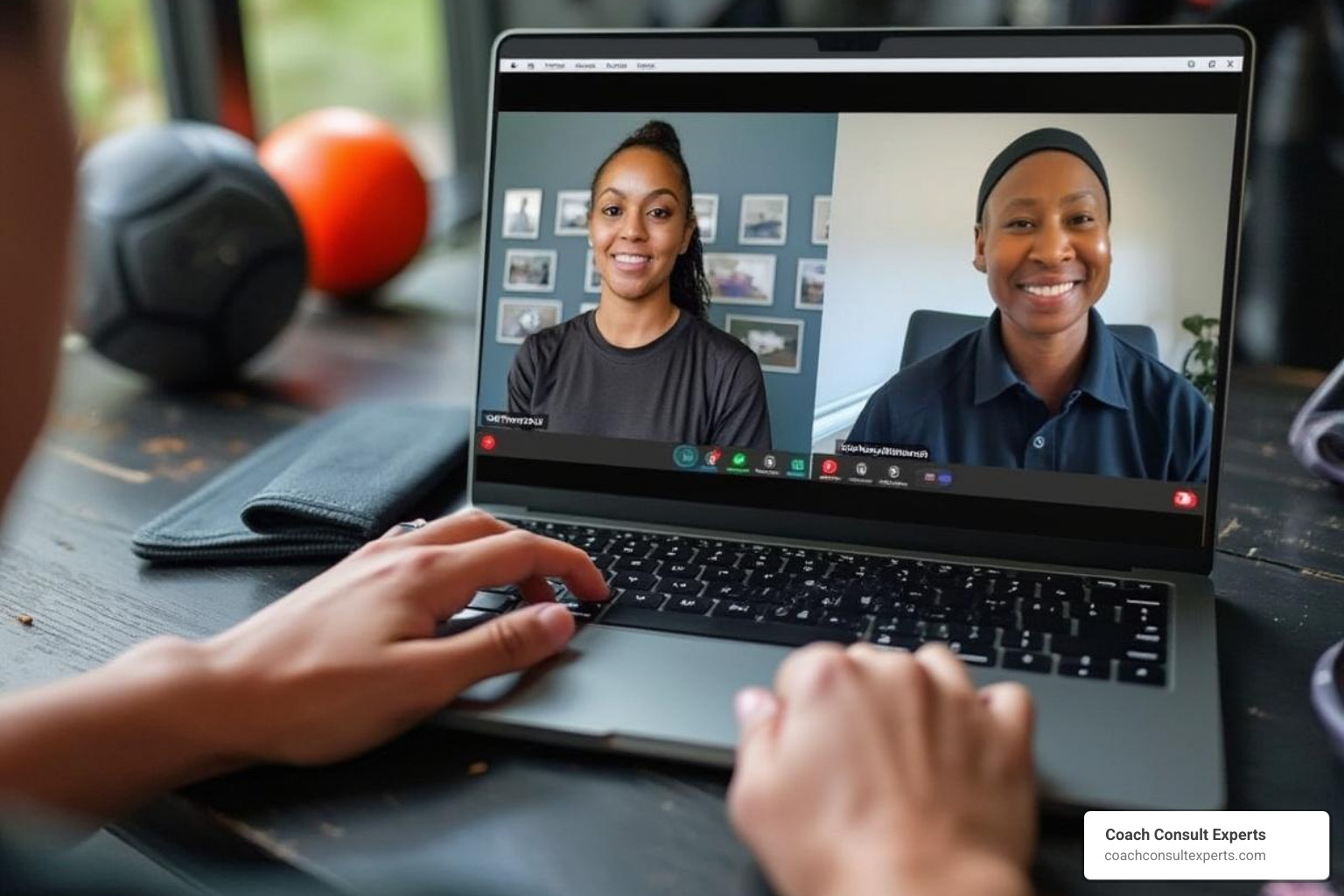
Walking into your first mindset coaching session might feel a bit like stepping into unknown territory. Here’s what typically happens so you know what to expect.
Check-in time starts each session – usually about 5-10 minutes of catching up. Your coach wants to know how you’ve been feeling, what challenges you’ve faced since last time, and how you’re progressing on previous goals.
Skill instruction takes up the main portion of your session, typically 15-20 minutes. This is where you learn or review a specific mental skill. Your coach explains not just what to do, but why it works and how it applies to your specific situation.
Guided practice is where the magic happens – another 15-20 minutes of actually doing the work together. You might practice breathing exercises, work through visualization scenarios, or learn to restructure negative thoughts.
Action planning wraps up each session with 5-10 minutes of concrete next steps. You’ll leave knowing exactly what to practice, when to use your new skills, and how to handle specific situations.
The goal is simple: you should leave each session with tools you can use immediately. No waiting weeks to see if something works – you’ll know right away because you’ll feel the difference.
Frequently Asked Questions about Sports Mindset Coaching
What’s the difference between mental toughness and mental health?
This is one of the most important questions athletes and parents ask, and understanding the difference can help you get the right support.
Mental toughness is all about performance skills. It’s your ability to stay focused when the game is on the line, bounce back quickly after making a mistake, and maintain confidence even when things aren’t going your way. Think of it as your mental toolkit for competition and training.
Mental health, on the other hand, is about your overall psychological well-being. This includes clinical concerns like anxiety disorders, depression, or other conditions that might need professional medical attention.
As a sports mindset coach, I focus on building that mental toughness and teaching performance skills. I’m not licensed to diagnose or treat mental health conditions, but I work closely with mental health professionals when an athlete needs that kind of support.
Here’s how it works in practice: if you’re struggling with performance anxiety before games, that’s typically something we can work on together using breathing techniques, visualization, and confidence-building strategies. But if you’re dealing with persistent anxiety that affects your daily life beyond sports, I’ll connect you with a licensed therapist while we continue working on your performance goals.
Who can benefit – athletes, parents, or whole teams?
The short answer is: pretty much everyone involved in sports can benefit from mindset coaching.
Athletes at every level see improvements from mental skills training. I’ve worked with 8-year-olds just starting out in youth sports who needed help with confidence, all the way up to professional athletes fine-tuning their mental game. The techniques adapt beautifully to different ages and skill levels.
Parents often find mindset coaching incredibly helpful too. Sports parenting can be emotionally intense! I help parents learn how to support their children effectively without adding pressure, manage their own emotions during games, and create positive home environments.
Whole teams can transform their culture through group mindset coaching. When an entire team learns the same mental skills and communication strategies, you see improvements in team chemistry, collective resilience, and overall performance.
The beauty of mental skills training is that these tools transfer everywhere. The confidence and resilience you build for sports shows up in school, work, and relationships too.
How long before I see results?
This is probably the question I get asked most often, and I love answering it because the timeline is usually much faster than people expect.
Within the first 1-2 weeks, most athletes notice immediate benefits from basic techniques. Simple breathing exercises can provide instant relief from pre-game nerves, and focus strategies often improve concentration right away.
By 3-4 weeks, you’ll typically start seeing more substantial changes. This is when athletes report feeling more confident, performing more consistently, and handling pressure situations better. As one athlete told me, “I started to see results in about three to four weeks” – and that’s pretty typical.
The real magic happens at 3-6 months of consistent practice. This is when the mental skills become automatic, and you develop those deep mindset shifts that create lasting change. Our research shows that athletes following structured programs demonstrate improvements of over 50% after two months and over 100% after six months.
But here’s the key: just like physical training, mental training requires consistent practice. The athletes who see the fastest and most lasting results are the ones who actually use the techniques we practice together.
Conclusion
Working with a sports mindset coach can be the spark that takes you from good to truly great – not just in your sport, but in every part of your life. Whether you are just starting out, chasing a scholarship, or looking to extend your professional career, mental skills like confidence, focus, and resilience can make all the difference.
The best part? These skills don’t stay on the field or court. The confidence you build in competition shows up in the classroom or workplace. The grit you develop in tough games will help you bounce back from life’s setbacks. And learning to focus under pressure can make everything – from relationships to personal goals – a little bit easier.
If you are tired of letting self-doubt, nerves, or fear of failure hold you back, investing in mindset training is one of the smartest choices you can make. At Coach Consult Experts, we are passionate about helping athletes and performers break through barriers, rewire old ways of thinking, and create lasting fulfillment. Our approach combines rapid subconscious change with powerful group support, so you always feel encouraged and never alone on your journey.
So, if you are ready to open up your next level – both on and off the field – now is the time to take action. The mental tools you build today will serve you well for years to come. You do not have to do it alone. Learn more about VIP Coaching and see how we can help you write your own success story.
Remember: your physical abilities have brought you this far, but it is your mindset that will carry you the rest of the way. The only thing standing between you and your best self could be just one mental skill away.
We are here when you are ready to take the first step.

